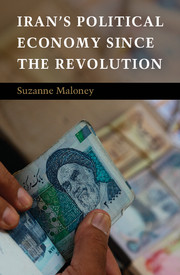Book contents
- Frontmatter
- Contents
- 1 Introduction
- 2 The Prelude: The Political Economy of Prerevolutionary Iran
- 3 The Economics of Upheaval, 1977–1980
- 4 The Cost of the Sacred Defense, 1980–1989
- 5 The Reconstruction Jihad, 1989–1997
- 6 Ayatollah Gorbachev: Reform within the Red Lines, 1997–2005
- 7 Populism, Version 2.0: The Ahmadinejad Era, 2005–2013
- 8 Energy and the Islamic Republic
- 9 Sanctions and the Sacred State
- 10 Conclusion
- Appendix
- Selected References
- Index
5 - The Reconstruction Jihad, 1989–1997
Published online by Cambridge University Press: 05 August 2015
- Frontmatter
- Contents
- 1 Introduction
- 2 The Prelude: The Political Economy of Prerevolutionary Iran
- 3 The Economics of Upheaval, 1977–1980
- 4 The Cost of the Sacred Defense, 1980–1989
- 5 The Reconstruction Jihad, 1989–1997
- 6 Ayatollah Gorbachev: Reform within the Red Lines, 1997–2005
- 7 Populism, Version 2.0: The Ahmadinejad Era, 2005–2013
- 8 Energy and the Islamic Republic
- 9 Sanctions and the Sacred State
- 10 Conclusion
- Appendix
- Selected References
- Index
Summary
With the war's end, a momentous new chapter in the Islamic Republic's history began. Its leadership confronted the task of recapitulating the system and adapting to the void opened by Khomeini's death, while also harmonizing its ideological verities with the calamitous realities wrought by the revolution and the war. The reconstruction program had a self-sustaining logic arguably as compelling as that of the war. The sheer exigencies of Iran's collapsing economy drew the political elite to an unusually swift consensus around both the leadership transition and the details of a plan to rehabilitate what was damaged by the war and revive Iran's stalled potential. The shock associated with the long conflict's sudden end, and Khomeini's death just a year later, helped facilitate the convergence, offering a clean break for his heirs to reinterpret his mandate.
The reconstruction era expedited trends already under way within Iran, prodding the Islamic Republic from revolutionary to routinized, from messianic to mundane. However, the process of normalizing the revolutionary state proved neither smooth nor wholly successful. Over time, the postwar agenda faltered, as a result of the factional contention and institutional dualism that have been the Islamic Republic's hallmarks. Major economic reforms were undertaken, but the fundamental reorientation stalled amid political opposition and financial pressures.
The reconstruction era played a major role in shaping Iran's subsequent evolution. The clashes between Rafsanjani, the reforms' architect and chief advocate, and the Islamic leftists, who remained wedded to state-centric policies and viewed capitalism as a betrayal of the revolution's ideals, precipitated a transformation in the Islamic Republic's ideological battleground. From these tensions emerged the first serious movement to reconsider the tenets of Iran's Islamic state. Having found themselves suddenly sidelined on the margins of the state they had helped create, Iran's “Islamic leftists” began to reassess their handiwork and plot their way back to power. Their ascendance would close the door on Rafsanjani's presidency and, at least temporarily, on the path he had adopted.
- Type
- Chapter
- Information
- Iran's Political Economy since the Revolution , pp. 192 - 257Publisher: Cambridge University PressPrint publication year: 2015



